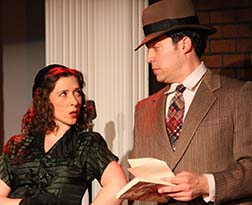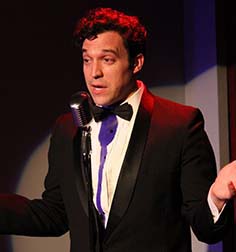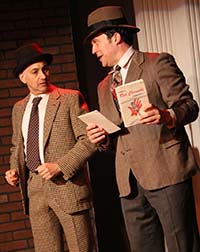
Lucy Komisar
| “Finks” is powerful, lively, entertaining drama of what HUAC did to playwright Joe Gilford’s actor parents
It was the worst of times. Lillian Hellman aptly called it “Scoundrel Time.” It was the early 1950s. Joe Gilford’s play dramatizes the attack on free thought and free speech orchestrated by ruthless politicians who built careers by destroying the lives of actors, writers, directors and their families. It’s based on what happened to his parents, Jack and Madeleine Lee Gilford, victimized by the House Un-American Affairs Committee (HUAC). “Finks” is not an always dark play. Gilford’s father, played as Mickey Dobbs by the fine Aaron Serotsky, was a nightclub comic at Café Society. (Barney Josephson’s place broke the color bar by welcoming both black and white patrons.)
Mickey quips: “I just found out that Joe McCarthy is about to expose two million more communists. He just got his hands on the Moscow phone book. You can’t be too careful these days. Everyone’s scared, even us comedians. Red Buttons is so terrified, he changed his name to “Blue”. It’s gotten so bad, I heard you can’t even borrow a book from the public library without someone tapping your telephone. And they’re right. I mean, what if you were seen reading–the Constitution??” The Madeleine Lee Gilford character, Natalie Meltzer, portrayed by the excellent Miriam Silverman, jokes about “eau de proletariat.” She is a radical organizer and gets Mickey involved. He tells a friend that she is “Emma Goldman trapped in the body of Paulette Goddard.” Serotsky is a charmer as Mickey. Silverman is funny and tough as nails as Natalie. Aside from the Hollywood blacklist, broadcast artists were targeted by Red Channels, a newsletter run by two individuals who listed alleged communists in TV and radio. Network CEOs and sponsors read it and did as they were told. Of course, they denied there was a blacklist. Mickey and his pal Fred perform an Abbott and Costello routine about finding themselves in Red Channels.
MICKEY (as BUD ABBOTT) holds a copy of Red Channels) See this Lou? FRED (as LOU COSTELLO) I know what that is, Abbott. That’s Red Channels. MICKEY That’s right. FRED That’s the blacklist. MICKEY No, Lou. There is no blacklist. FRED Then how come people lose their jobs who end up in there? Giovanna Sardelli directs in smooth, lively fashion a collection of fast-paced vignettes, even musical numbers such as “Sing me a Song of Social Significance” from “Pins & Needles.” The action shifts between café, home and the chilling HUAC interrogations by Rep Francis Walter (Michael Cullen).
Bobby Gerard (Leo Ash Evens as choreographer Jerome Robbins), is a friend of the Gilfords and part of the story. Often, we see him pirouetting and posing as he conceives and steps through routines. Then we see him before the committee doing another turn. Committee staff had threatened to expose him as a homosexual. At a hearing, Martin Berkeley, a film writer and a communist, says his “Working Artists Section” raised funds to encourage racial integration and equality in such areas as education and employment. It’s not made clear, but the group would have been a “front,” recruiting non-party members. He tells the committee that people at the meetings included the essayist and humorist Dorothy Parker, the actress Gale Sondergaard (“Anna and The King of Siam”), the film writers Ring Lardner Jr., Dalton Trumbo and more. The “finks” were just as prominent and seeking to save their careers. Elia Kazan, director of “Death of a Salesman” and “Streetcar Named Desire,” had been blacklisted for three years. Lee Cobb, a cooperative witness, also hadn’t worked during that time. Another friendly testifier was Budd Schulberg, who wrote “On the Waterfront.”
Natalie has guts enough for all of them. Walter asks her, “Were you from 1942 to 1945, a member of another known Soviet front, “The Actors League to Win to the War”?” She replies, “Was that a Soviet front organization?” He says, “Yes, Mrs. Dobbs. In our records and previous testimony, yes, it was a communist front, The Actors League to Win the War.” She ripostes, “Should I have been a member of the Actors League to LOSE the War?” She pushes her husband to support the blacklist victims. “Just think of what you’re gonna tell our son.” Then Mickey goes before the committee and names some names, but it’s not quite what Walter expected. The congressman says, “So would you please tell us then, the names of these individuals who are, in fact, trying to undermine our democracy and this country. Mr. Dobbs?” He replies, “They are—-CBS, NBC and ABC. They are Proctor & Gamble corporation—Colgate-Palmolive, American Tobacco, Kellogg’s, and Ford Motor Company—“ He says, “Those people are Red Channels, Aware Inc., Mr. Lawrence Johnson of Syracuse, The American Legion—“ And the columnists, “Jack O’Brian, Walter Winchell, Dorothy Kilgallen–All of whom are waging a dedicated war on our Constitution and our liberty as citizens by creating a blacklist and victimizing individual artists—“ After the performance I attended, a panel included blacklisted actress Lee Grant (“Shampoo”). She recalled that, “Ronald Reagan was president of SAG, the Screen Actors Guild, and turned everybody in.” She said that television was controlled by huge conglomerates which sponsored shows such as the Philco Television Playhouse. They could control casting. But she pointed out that Actors Equity agreed not to allow a blacklist in the theater. That showed that the persecutors could be blocked if people in the industry showed courage.
Visit Lucy Komisar’s website: The Komisar Scoop |
| museums | NYTW mail | recordings | coupons | publications | classified |





